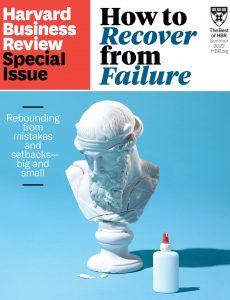
Harvard Business Review OnPoint – Summer 2022
English | 126 pages | pdf | 38.82 MB
IN APRIL 2011, Harvard Business Review magazine published an issue on failure; it’s become one of our most revisited volumes. In his opening reflections, editor-in-chief Adi Ignatius called out a commonplace hypocrisy: Everyone talks about failure as necessary to learning, growth, and success, but we avidly avoid and punish it in real life.
Now failure—as both a strategy and a problem—feels like it’s on everyone’s minds more than ever. With the global pandemic placing seemingly endless obstacles before us and with expectations for performance higher than ever, setbacks for organizations loom large. Meanwhile uncertainty and rapid change have only deepened the need for organizations to fail fast.
In this volume we’ve collected the best of our articles on failure—what itis, its effect on us, how to recover from it, and how to learn from it. The articles in the first section describe what it takes for organizations to deliberately create certain kinds of failure in order to learn and grow faster. In the second section we address what happens when a failure is harmful enough that you need to launch a recovery effort: anything from helping a tech team identify just what went wrong on a failed code deployment to turning a company around from its lowest quarter on record.
In the last section we address what makes all these tactics tricky: that failure simply feels bad. Our brains often keep us focused on a mistake’s negative repercussions rather than on the opportunities it has unlocked. These articles describe how to shift that thinking by understanding the psychology of resilience and self-compassion.
The word “failure” derives from the Latin for “to trip” or “to stumble”—a nice reminder that even when it feels like you’ve lost all your forward momentum, you can always reset and keep on walking.
Download from: